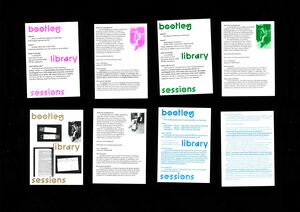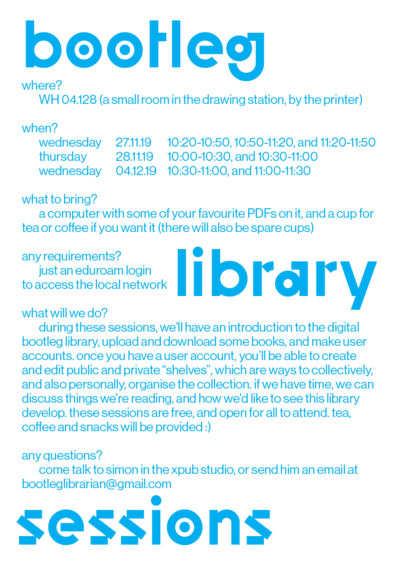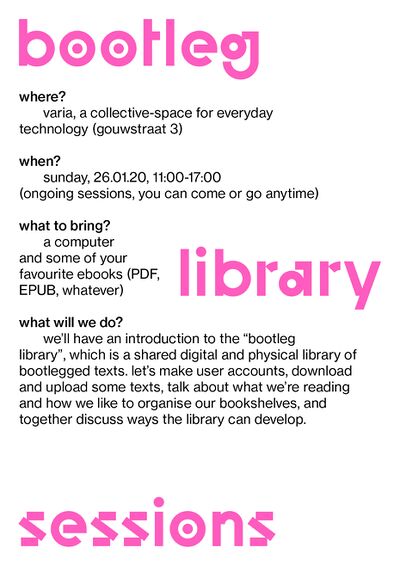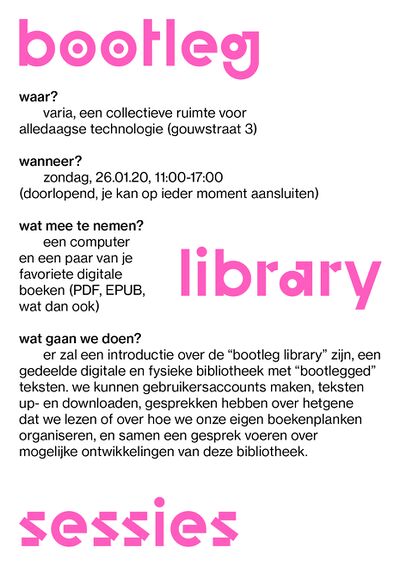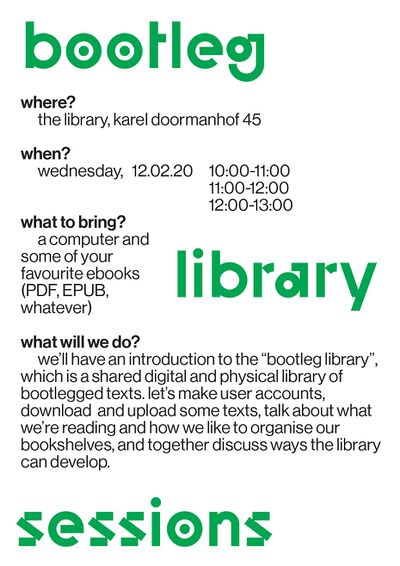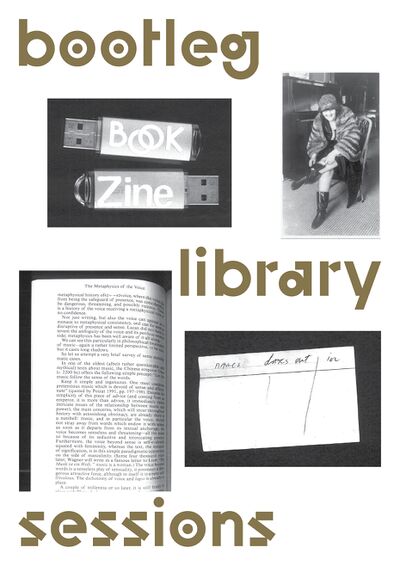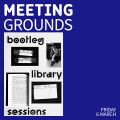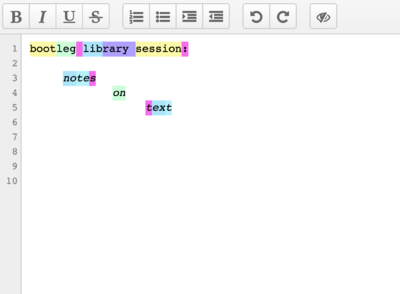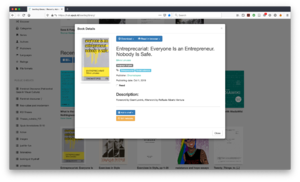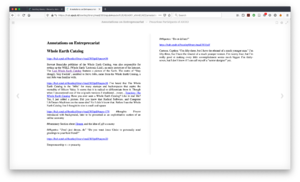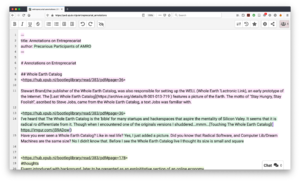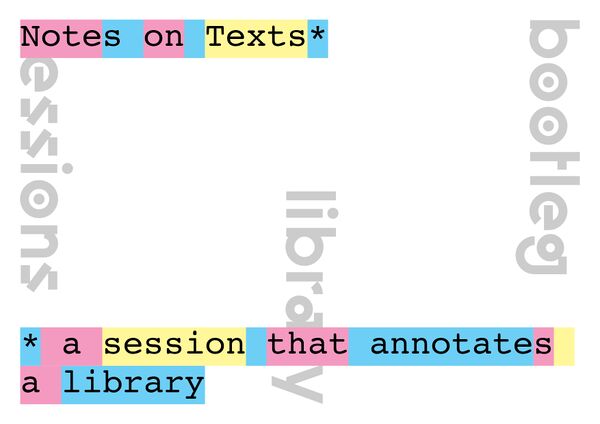User:Simon/bootleg library sessions: Difference between revisions
| Line 9: | Line 9: | ||
* digitise printed matter, including scanning and OCR | * digitise printed matter, including scanning and OCR | ||
* design, print and bind books for the physical bootleg library | * design, print and bind books for the physical bootleg library | ||
=== cards for bootleg library sessions === | |||
[[File:Bl sessions cards.jpeg|thumb|Cards produced for four different bootleg library sessions]] | |||
Description pad: https://pad.xpub.nl/p/Bootleg_Library_Workshop_Sessions_full_text<br> | Description pad: https://pad.xpub.nl/p/Bootleg_Library_Workshop_Sessions_full_text<br> | ||
Revision as of 08:12, 19 June 2020
bootleg library sessions
The bootleg library sessions are a series of meetings in which we will:
- create user accounts
- collectively determine the development of desired features in the library
- upload and catalogue texts
- classify texts in shelves, both public and private
- download, read, annotate and discuss texts
- digitise printed matter, including scanning and OCR
- design, print and bind books for the physical bootleg library
cards for bootleg library sessions
Description pad: https://pad.xpub.nl/p/Bootleg_Library_Workshop_Sessions_full_text
bootleg library at wijnhaven 61, 27.11.19, 28.11.19 & 04.12.19
description
The first bootleg library sessions were held in Wijnhaven 61, a building that houses several of the Piet Zwart Institute Master's Departments, including XPUB, Lens-Based, MIARD, and the Master in Arts Education. The building also is home to many bachelor students, and stations where students can prototype work. I decided to run introduction sessions in a small room in the drawing station. I advertised these sessions with posters and flyers, distributed throughout Wijnhaven 61 and the adjacent Blaak building. Sessions were organised as a come-as-you-are basis, running for half-hour intervals, but with an open invitation for attendees to stay as long as they liked. The initial purpose of these sessions was to acquaint attendees with the digital bootleg library, explore the interface, and create registered user accounts. There was also another purpose of meeting with other readers to discuss texts we were reading, and how we gained access to them. I kept an Etherpad document open for each session, where I could take notes on what was discussed.
photos
pads
Description pad: Bootleg Library Workshop Sessions
bootleg library sessions pad: Documentation of Session
bootleg library at Varia's L.E.D. (Library and Electronic Depot), 26.01.20
description
Varia is a collective-space in Gouwstraat, Rotterdam. On the last Sunday of each month they open their doors to the public to read books from their library and repair electronics, in what is known as the L.E.D (Library & Electronic Depot). I held a bootleg library session at the first L.E.D., which ended up being a sunny, relaxing afternoon sitting on cushions, discussing bootlegs, scanning, piracy, and the type of strategies that the physical bootleg library could employ.
photos
pad
https://pad.xpub.nl/p/Bootleg_Library_at_Varia_text User:Simon/bootleg lib varia pad
bootleg library at the Library, Karel Doormanhof 45, 12.02.20
description
This bootleg library session was held in a new space at Karel Doormanhof 45, called "The Library". The building is home to studios for Piet Zwart Institute MA Fine Arts participants. The first hour of the session was initially only attended by one other participant, and then others arrived. All told, there session was attended by 5 participants, including myself. The attendees interests were well reflected in the type fo texts we discussed and shared - literary theory, writing, 60s counterculture, the occult and magick. This was the first time I used the Tasks of the Contingent Librarian cards - these were distributed over the table, and put on offer for participants to choose and begin conversations about the various tasks I had been writing about; e.g. reading/writing, skimming/scanning, bootlegging, reprinting, uploading/downloading etc. This provided an easy entry point for participants to approach the topic of bootlegging and the contingencies this type of library offered.
photos
bootleg library at Meeting Grounds, Onomatopee Projects, Eindhoven, 06.03.20
description
Meeting Grounds is a public program organised by Onomatopee Projects, a Dutch publisher and cultural space in Eindhoven. This bootleg library session was held in Eindhoven at Onomatopee HQ as part of Meeting Grounds. It was attended by a group of friends, who were all of similar ages. After we cooked lunch together, I invited participants to explore the printed books in the physical bootleg library, and also the A6 cards I had been producing for my thesis Tasks of the Contingent Librarian. I hoped these would spark conversation about our experiences of sharing files and piracy. The participants wrote notes in a pad as they made user accounts for the digital library, and personal anecdotes came out of our experiences of filesharing during our formative years, bootlegged Britney Spears cds and "chipped" game consoles that could play bootlegged games. Some quite interesting questions arose about our attitudes towards piracy, for example the difference in moral perspective between pirating books, and pirating films. I distributed some blank index cards for participants to write their thoughts on - some of them drew pictures, others stayed within the lines and wrote about texts they would like to download and upload. The interface of the card is a low entry point into being able to contribute texts without speaking out and interrupting a conversation, something I'd like to explore in the future. The cards provide feedback, and then become part of the index.
photos
pad
https://pad.xpub.nl/p/Bootleg_Library_at_Meeting_Grounds
pad dump
User:Simon/20_03_06_Bootleg_Library_at_Meeting_Grounds_pad_dump
bootleg library at Art Meets Radical Openness 21.05.20
description
Bootleg Library Session: Notes on Texts The bootleg library is a particular, situated social infrastructure that operates from the understanding that the library is a collection of texts and readers. A reciprocal, self-reflexive relationship between the texts the readers produce, and the readers produced by the collection drives the sociability of the library. The bootleg library celebrates idiosyncrasy, and resists the singularity of the text.
A bootleg is an unauthorised copy of a source publication; bootlegging is a strategy by which texts acquire multiplicity of form and informal distribution methods, representing readers and connecting them with each other.
Abstract of session Notes on Texts is a session that annotates a library. It understands reading and writing to be fundamental library practices, and asks how new reader/writers may participate in producing texts that both describe the collection and represent themselves. This session will be centred around the *bootleg library*, a shared digital and physical collection of republished texts. Bootlegs; unauthorised copies of source publications that represent ourselves, our multiplicity and our shared interests. A library; a collection of texts and also the readers collected around them.
Previous bootleg library sessions have been moments to meet in various spaces with the people who frequent them, discuss things we read, add to the collection, and offer each other contingencies through the texts we share.
For this session we'll meet online in a web conference, in the digital bootleg library, and in a realtime collaborative text-editing environment. We'll explore how being together in- and out of sync and the mediums and techniques we use will shape the texts we share.
You are invited to experiment with annotation to produce texts by new readers (and writers), imagining ways that we can guide each other towards the things we read. What type of contingencies can we offer each other at our meeting and throughout AMRO2020, using the particular, situated social infrastructure the *bootleg library* maintains? How can we enrich texts through our annotations, and what kind of new texts can we produce through our notes?
Requirements The bootleg library has grown through individual contributions of a vast variety of texts. The collection includes many texts on critical feminist and media theory, literature, sound art, as well as technical manuals, but the collection is not exclusive to these interests. There is no set criteria for texts that can be included. Please come to this session with any ebooks that you are familiar with, are representative of your interests, and which you would like to share.
This session will focus specifically on annotation. Please prepare annotation(s) on the text(s) you'd like to include in the library.
File formats The bootleg library runs on calibre-web https://github.com/janeczku/calibre-web , and supports a wide range of file formats, including .pdf, .epub, .mobi, .docx, .odt, .rtf, .txt, .mp3, .mp4a, .cbr, .cbz, .cbt, and many more.
Outcomes
We planned to meet in an online web conference, in an Etherpad and in the digital bootleg library. This was tricky, given that many of us were meeting for the first time, and we didn't have the same visual cues to work with. After a brief tutorial, we went through the library and added annotations in a pad. This has been transposed here
The basic workflow was:
pdf > pad > markdown > pandoc > EPUB > library
We chose a page from a PDF in the library to annotate, then wrote on pad, collaboratively. Markdown was added to create basic structure (this was especially important for the hyperlinks), and then we exported a .txt file from the pad. This was then run through pandoc with the following command:
pandoc --from markdown --to epub my_etherpad.txt -o annotations.epub
The EPUB that was produced was then catalogued under the same listing as the PDF.
photos
pad
https://pad.xpub.nl/p/Art_Meets_Radical_Openness_2020
User:Simon/Notes on texts workflow
bootleg library at meeting grounds online 04.06.20
description
Notes on Texts is a session that annotates a library. It understands reading and writing to be fundamental library practices, and asks how new readers/writers may participate in producing texts that both describe the collection and represent themselves.
This session will take place with (and within) the bootleg library, a shared digital and physical collection of republished texts.
Bootlegs; unauthorised copies of source publications that represent ourselves, our multiplicity and our shared interests.
A library; a collection of texts and also the readers collected around them.
Previous bootleg library sessions have been moments to meet in various spaces with the people who frequent them, discuss things we read, add to the collection, and offer each other contingencies through the texts we share.
For this session we'll meet online in a web conference, in the digital bootleg library, and in a real time collaborative text-editing environment. We'll explore how the mediums and techniques we use will shape the texts we share. You are invited to experiment with styles of annotation to imagine ways that we can guide each other towards the things we read. How can we enrich texts through our annotations, and what kind of new texts can we produce through our notes?

